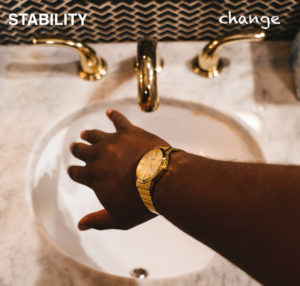THE BASIC PRINCIPLE BEHIND HUMANITY
This year we have been subject to extraordinary change. As the Chinese saying goes, "may you live in interesting times." And this is not meant to wish one well.
We have had to make many sacrifices. But we have also risen up to the challenge and learned and innovated along the way.
THE RHYTHM OF CHANGE
This raises the crucial question, what is the normal state of affairs? Is it stability or is it change? Or is there a rhythm, a cycle of stability and change? When do we need adapt and when do we have a claim to the status quo? Can we plan for the future, or should we just play it by ear?

Let's go back in time.
To some of our denying citizens who fight for the freedom to keep the status quo this might come as a surprise, but neither the corona pandemic, nor climate change are the first time, humans have had to adapt.
In fact humanity is about adaption. As societies and species we have survived because of ability to adapt to new environment. We are still proud inhabitants of this planet because we have continuously managed to adapt to our environment. There others who were far worse adapters than us. "Competition and changes to their habitat due to climate change were two of the main factors" why Neanderthals went extinct, says Briana Pobiner, from the the Smithsonian’s National Museum of Natural History.
This is quite an achievement, if we think about it. We have a legacy here.
Also our current lifestyles, which, even during these times, are quite effortless compared to our ancestors just hundred years ago have been enabled by our ability to evolve.
On a more mundane level, today we are able to communicate via an invisible network of small pieces called microchips, instead of communicating via smoke signs. This is also because we can learn and adapt.
If this still doesn't convince you, leaving you in doubt about our ability to evolve, then try debating this topic with a chimpanzee and see how that works out.
WE'VE HAD SOME TAKEN SOME TIME OFF FROM CHANGE
To be fair, we have had a break from adaption for quite a few years now. At least as it concerns the harsh adaption, that required us to change our behaviors. You could argue that the time between the second world war and the credit crisis gave people in the developed world a generous break from adaption.
In the past 70 years, we saw a long streak of stability. Economies in the Western World were booming, and the tempting offer was that in exchange for a college education and your dedicated time, we would get a fixed salary, relative job security, with the prospect of buying a house, getting married and having children, and entering into a safe retirement.
THE HEAT'S BEEN TURNED UP
In the past years however, the volume of change has been dialed up again.
Next to pandemics, our day and age provides us with two more big buckets of change to handle.
We are facing climate change, and we are facing a reshuffling of our work lives, which is commonly summarized under the term ‘digital transformation’.
With climate change we will have to continue to redefine our lifestyles and learn to live with it. We have to question whether these short distance flights make sense anymore. May be we find out that trains are actually more comfortable, with the right infrastructure in place. At some point, we may have to question whether moving one seventy kilogram person from A to B within a city requires to move two tons of SUV with this person. I am confident, that, as humans we are able to find better solutions to these use cases.
Then we have the reshuffling of our work lives. Due to the decline of entry barriers across industries, our companies and their employees, are no longer protected from competition. Thanks to technology, the increasing contentedness of our economies, outsourcing, products as services and other shifts, essentially every step along the value chain of a business can be transformed into a new mode. If the Lego version 1.0 of our businesses used to have only red bricks available, today's business 3.0 can be built from a variety of color combinations. Along the way, automation, algorithms and AI are taking over more of our work. All of this leads to ever changing business models, which we will explore in more depth “Intangible Economics”.
As a result the old rulebooks do not apply anymore. We have seen almost every aspect of our business' value changes evolve. We have started to redefine our job roles as well as the skills and education that those roles require. With new work-tools and new tech stacks being constantly made available to us, we will continue to redefine how we actually perform our work as well as the channels through which we communicate with co-workers, partners and customers.
This means that we do not adapt to a new state. Adaption is the new state.
It's not as if we have to adapt, and then the world stays still and says "hey welcome to our new static world, thanks for finally catching up, how can I help you."
THERE IS NO NEW NORMAL.
THERE IS JUST THE NEW FLUID.
Not only do we need to adapt our skillset, adaption itself has become one our most valuable skill.
This triplet of change corona, climate and digital transformation requires us to leave our habits and comfort zone. In this way, Corona is just the dry run.
Change is the new sidekick we will have to become friends with.
And luckily, many of us are ready to bite the bullet, whether we self-quarantine to fight a pandemic, whether scale down energy-consuming habits to battle climate change or whether we learn new skills to adapt for our changing professional roles.



